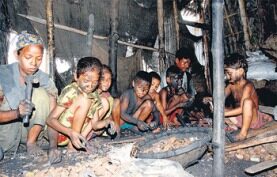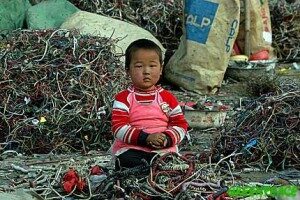Physical Address
304 North Cardinal St.
Dorchester Center, MA 02124
Physical Address
304 North Cardinal St.
Dorchester Center, MA 02124

Child slaves
In the summer of 2010 I started an internship with the Office of Migrant Affairs in Michigan with intent no greater than satisfying my college credit in order to graduate. Shortly after starting the internship I learned that it was legal for 12 year olds to work unlimited hours in the picking fields. This angered me and broke my heart, I felt a need to do something about it and that’s when I decided to focus my internship experience on learning about child exploitation in agriculture with intent to bring this subject to light. The result of my internship was a summer full of research, interviews, and never ending questions.
Who works the land in the USA? Prior to the industrial revolution most citizens worked the land and provided their own food. However, globalization and modernization have decreased the number of small farms while increasing competition, meanwhile the rise of the service and high-tech industries has decreased the number of people who want to work in agriculture. In fact, today only less than two percent of Americans work in agriculture. Agrarian work is very labor intensive, working long hours and often around dangerous equipment and hazardous chemicals.
In order to keep food prices at a global competitive level the agricultural industry in the US evolved to using immigrants (mostly from central and south America) for the manual labor as they are more willing to work for low compensation often being less than the minimum wage. This may not be a surprise to many but what most people don’t know is that young children are part of this group too; we’re talking about 400,000 children working in agricultural fields. So then I start to wonder…
What is the main reason for children working in the fields? Through my research I found it was necessity and not greed. According to exemptions found in the FSLA, agricultural workers do not get paid overtime for their long hours of labor. Most field workers get paid on a piece-rate-basis, in other words, a flat amount for every crop unit (bushel, bucket, etc.) they complete. Even though agricultural employers are to pay the minimum wage, or the equivalent through a piece-rate basis, the reality is that most pay well below it. Due to a lack of government supervision and regulation, the minimum-wage laws are not strictly enforced.
Why are the parents making their children work? Before blame can be placed solely on parents we must understand the culture of the average field worker. Most field workers come from Gemeinschaft type societies, which are communal, based with strong family relationships and a strong sense of responsibility to the group and not the individual. Consequently, the family members, including the children of these field workers, will put their family wellbeing above their own. Therefore it is no surprise that most of the children voluntarily help the family. There is no coercion present here, which is important to understand because it means we are not talking about children being forced to work.
Isn’t it illegal for children to be working in the fields? According to the Fair Labor Standards Act (FLSA), children as young as 12 can work unlimited hours in farming as long as they have parental consent. The reasons for this part of the FLSA are not quite known, but some argue that it is to protect small family farms from getting penalized for using their children to help them during the peak periods of farming. While this made sense in the time when most farming was done by small family operated farms, the law makes no distinction, thus many big farms continue to allow children to work long hours in the fields on a daily basis. This FSLA loophole needs be amended and/or expanded because it is too easily abused and functions at the expense of the child workers.
How can we protect the laws if we don’t have anyone to enforce them? During 2010 the State of Michigan had approximately four Migrant Labor Housing inspectors that were to inspect and license over 850 Migrant Labor Housing Camps, which represents only about one fifth of all farms that need licensing! This is no different than having a town with one police officer; while the officer is serving one call a dozen other crimes may be committed. Even with lenient laws and the lack of enforcement there are many social programs to assist field worker families.
Why don’t the field worker families take advantage of government aide? Unfortunately most people are unaware of the existence of these programs and many of the people who know about such assistance are scared of the law or do not know their rights to get said help. Statistics by The Report on Youth Labor Force in 2000 show that only 46% of field worker families with children received food stamps, 16% received assistance for women and children and only 11% received TANF/AFDC. These figures are surprising especially since over 56% of these families live below the poverty threshold.

World of Wonders
All the previous arguments were based on the notion that it’s wrong for children to work on agriculture. One may point out plenty of children have worked in farms ever since farming first started, and that many still do today. At the beginning of my research I had those notions in the back of my mind too…
What’s wrong with children helping their parents in the fields? Agriculture is one of the most dangerous lines of work with a mortality rate of 30% for work related deaths. It is especially hazardous for children under the age of 15 as they have a fatality rate that’s 80% that of the adults.
What makes farming so dangerous for children? Pesticides, heavy machinery, and excessively long work hours make farming dreadfully hazardous for children. Though natural types of pesticides have been used for centuries, the 1940’s-1950’s made synthetic pesticides more widespread and have now become an essential part of farming. However, working around pesticides can lead to many serious health issues, especially with the young and the unborn. Pesticides have been found to cause developmental problems such as stunted growth, low birth weight, poor coordination/memory and has even been attributed to causing cancer and increased mortality rates.
I must point out that the complaints concerning pesticide-related illnesses have decreased throughout the years and the argument for this is that the pesticide makers are making safer products that do not linger in the crops as long as previous pesticides have. However, complaints may not been made because many pesticide effects are long term, people are scared of losing work if they complain, or do not want to get ridiculed for complaining. Thus the numbers of complaints do not show a true picture in which hundreds, if not thousands of children and adults are slowly and unknowingly being stricken with disease or killed.
Due to children being less experienced, weaker and smaller than adults, it is more dangerous for them to work around heavy machinery and sharp tools. Hearing problems, lacerations, dehydration and back problems are the more mild threats young ones face. Amputations, malnutrition, and death though not as common, are still a reality for many children. The constant toiling of the children forces many of them to choose between work and school, unfortunately not enough choose to stay at school as 37% of the children in the farms completely drop out and 15% are studying below their grade. Since so many children do not get educated they are more likely to stay poor, and feed a vicious cycle in which most will become field workers dooming another generation to a life of hard, dangerous, and underpaid work.
What can we do to correct this problem? We must change policy, provide the necessary resources to the regulating agencies to do their job effectively, and increase education. When it comes to children’s employment in agriculture the FLSA is outdated, unfair, and unjust. How is it that teens 14 and 15-year-olds cannot work in fast food establishments more than three hours outside of school but a 12 year old can work unlimited hours in farming? This is the first provision we need to change. Increasing the age at which children can work and limiting their hours is the beginning.
We need better enforcement of the law as well because regardless of policy, if there is no one to enforce it, people won’t follow the law. Our enforcement agencies need more field inspectors and the process of penalizing needs to be more efficient. We need to make sure that field workers are getting paid at least the minimum wage, especially if they’re getting paid on a piece-rate basis. With more inspectors and with faster prosecution times the employers will be less likely to try to get away with unsafe working conditions and exploitation of their workers.
Finally, we have in place many programs to help care for and tutor children. Unfortunately, many families don’t know about the resources or do not have the means to access them. If we educate individuals within the community to serve as educators and community organizers they will in turn educate their communities. This has proven to be more effective and efficient than trying to educate a whole group of people. Education is the best tool and if used well it can have extraordinary effects.
Children working in the fields is a serious problem that costs hundreds of thousands of kids their youth, health, and future. It is caused by faulty policy, lack of protection, and ignorance. By taking action we can make a difference in the lives of not only the children but their families and our own. This is a serious problem that’s so depressing that one may have a hard time believing it’s happening here, in the land of the free. Unfortunately, even after only a couple of months of a summer internship, I see that this is as serious as the cancer and the deaths happening to these kids. Even if we do a little we can make a difference, organizations like AFOP, Our Own Backyard, Stop Child Labor, Migrant Legal Aid amongst others are already making a change for good, but they won’t be able to do it alone.
—
Child Labour – A Global Problem
![]() Tweet This Post
Tweet This Post
Related posts: